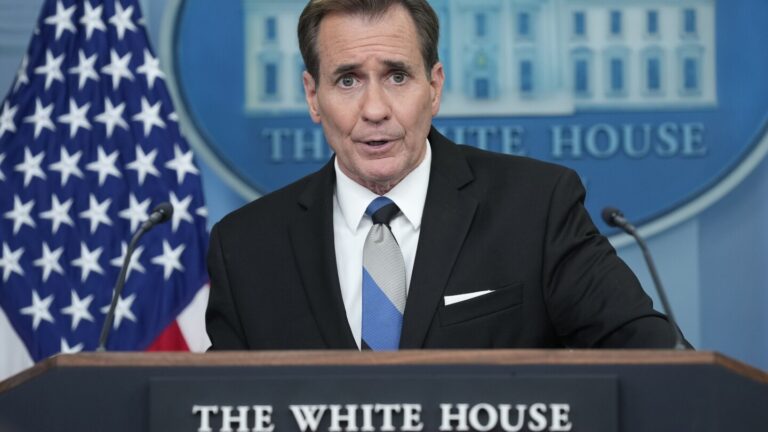The United States expanded sanctions against Russia on Wednesday as G7 leaders prepare for a summit in Italy where strengthening support for Ukraine and weakening Russia’s military will be top priorities.
Wednesday’s package targeted Chinese companies that support Russia’s war in Ukraine and increased risks for foreign financial institutions doing business with sanctioned Russian entities.
The sanctions also targeted Russia’s financial infrastructure, seeking to restrict the amount of money moving in and out of the country. Shortly after the sanctions were announced, the Moscow Stock Exchange announced it would suspend trading in dollars and euros.
The United States has imposed sanctions on more than 4,000 Russian companies and individuals since the war began, trying to block the flow of money and weapons to Moscow, whose superior firepower gives it an advantage. Gain an advantage on the battlefield In recent months, Russia has been trying to restructure its supply chains, with new companies springing up.
“We have to be honest and acknowledge that President Putin is a very capable adversary who is willing to adapt and find allies,” Aaron Forsberg, director of the State Department’s Office of Economic Sanctions Policy and Implementation, told The Associated Press.
Therefore, sanctions against Russia are a “dynamic issue,” he said.
This includes making addresses public for the first time in order to crack down on businesses reopening at the same address under a different name.
The sanctions have not stopped the flow of illicit goods, but their aim is to make it harder for Russia to procure critical technology and raise prices for the goods. Wednesday’s measures target more than $100 million in trade between Russia and suppliers for the war effort.
The more than 300 new sanctions are aimed at blocking individuals and companies, mainly from countries such as China, the United Arab Emirates and Turkey, from helping Moscow circumvent Western blocks over access to key technologies. They also threaten to impose sanctions on foreign financial institutions that do business with nearly any sanctioned Russian entity, underscoring the U.S. view that the Kremlin is delegitimizing the Russian economy. Preparations for war.
Treasury Secretary Janet Yellen said the Russian military “desperately craves access to the outside world.”
The announcement came just before President Joe Biden arrived in Italy, where he and other G7 leaders are urgently considering providing assistance to Ukraine. Frozen Russian assets This has been converted into billions of dollars in aid for Kiev.
Seven companies based in China and Hong Kong were targeted on Wednesday for allegedly shipping millions of dollars’ worth of supplies to Russia, including items that could be used for Russian weapons systems.
U.S. officials say China is a major supplier of critical components to Russia and supplies technology to both China and the West.
The United States on Wednesday imposed sanctions on a Chinese state-owned defense company for shipping military equipment for use in Russia’s defense sector.
Benjamin Hilgenstock, a senior economist at the Kyiv University of Economics, said the move sent a message that the United States was “ready to tread into more dangerous territory” by increasing pressure on Beijing.
“We will address (China’s) support for Russia’s defense industrial base, and we will confront China’s non-market policies, which have harmful global ripple effects,” White House national security spokesman John Kirby told reporters on Tuesday.
China did not impose sanctions on Russia after Vladimir Putin invaded Ukraine, and Putin Visit to China in May By emphasizing the development of strategic relations between the two countries.
“The Chinese leadership has no interest in making these sanctions successful,” said Jannis Kluge, an expert on Russia sanctions at the German Institute for International and Security Studies in Berlin.
Kluj said Beijing was reluctant to stop valuable trade that is worth a lot of money and “doesn’t want to increase pressure on Putin with this war.”
Imports from China are crucial for Russia because Beijing is a major producer of critical components, including for Western companies. Chinese companies also act as middlemen for selling and shipping Western components to Russia.
But while Chinese technology has been found on the battlefields of Ukraine, most of the components still come from Western countries, including those “overwhelmingly” found in high-tech drones and ballistic missiles, Hilgenstock said.
In addition to China, the United States is targeting companies in Turkey and the United Arab Emirates that officials say send high-priority goods to Russian companies, including some that are already subject to sanctions.
The White House said in December that foreign financial institutions that work with Russian defense sector companies could face sanctions. Wednesday’s expansion of sanctions means those financial institutions could face similar measures if they work with almost any sanctioned Russian company.
Jake Sullivan, a top foreign policy adviser to US President Joe Biden, told reporters on the way to the G7 that the message to China and other countries was that “you run the risk of falling foul of the Treasury and being put into a sanctions regime”.
The fear of secondary sanctions is an effective threat, analysts say.
While President Xi Jinping may not want to encourage Western sanctions against Russia, “Chinese banks have always been very careful not to become targets of secondary sanctions, because that would be very costly,” Kluj said, pointing to examples of Chinese banks cutting ties with Russian clients.
The package will hinder the development of Russia’s energy sector, Future cash sourcesThis includes an Arctic liquefied natural gas project, where key LNG technology has been shipped by Chinese companies.
In addition, this package Forcibly deporting Ukrainian children to Russia and deporting them from the country. Five people from Russia and Russian-occupied Ukraine were sanctioned for participating in the forced militarization and re-education of children and for providing the children with Russian passports.
—-
AP White House reporter Colleen Long was aboard Air Force One and contributed to this report.

